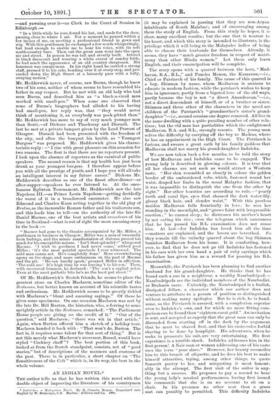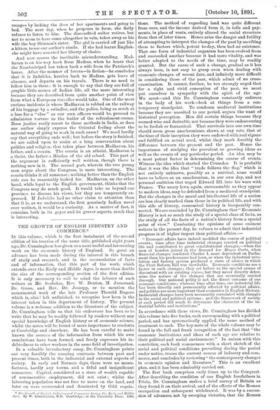AN INDIAN NOVEL.*
THE author tells us that he has written this novel with the double object of improving the literature of his countrymen
• Indul.ka : a Malayalam Novel. By D. Chandn Menon. Translated into English by W. Dtimesone, C.S. Madras : Addison and Co. 1890.
(it may be explained in passing that they are non-Aryan inhabitants of South Malabar), and of encouraging among them the study of English. From this study he hopes, it is clear, many excellent results ; but the one that is nearest to his heart, and which this story is intended to illustrate, is the privilege which it will bring to the Malayalee ladies of being able to choose their husbands for themselves. Already, it seems, they have "much greater freedom in respect of matri- mony than other Hindu women." Let them only learn English, and their emancipation will be complete.
The story opens with a quarrel between the hero, "Mad- havan, B.A., B.L.," and Panchu Menon, the Kamavan,—i.e., Chief or Patriarch of his family. The cause of this quarrel is a boy, Shinnan by name, whom Madhavan is anxious to educate in modern fashion, while the patriarch wishes to keep him in ignorance, partly from a bigoted love of the old ways, partly because the boy is not "a direct Anandravan,"—i.e., not a direct descendant of himself, or of a brother or sister. Shinnan and three other of the characters in the novel are children of the Patriarch's "grandmother's sister's grand- daughter "—i.e., second cousins one degree removed. All live in the same dwelling with a quite puzzling number of other rela- tives; but the old man has partialities which the enlightened Madhavan, B.A. and B.L., strongly resents. The young man solves the difficulty by carrying off the boy to Madras, where he has an appointment in the High Court. The Patriarch is furious, and swears a great oath by his family goddess that Madhavan shall not marry his grand-daughter Induleka.
We are now taken back a few months, to be told the story of how Madhavan and Induleka came to be engaged. The young lady is described in glowing colours. It is true that all her charms are not such as would attract a Western taste. "Her skin resembled so closely in colour the golden border of the embroidered robe, which, fastened round her waist, draped her limbs in the usual Malaylee fashion, that it was impossible to distinguish the one from the other by sight." Her other beauties are according to rule,—" pearly teeth and coral lips, eyes that shamed the dark water-lily, glossy black hair, and slender waist." With this peerless maiden Madhavan falls frantically in love; he sees her standing in the moonlight, and "grows faint with irrepressible emotion ; " he cannot sleep ; he distresses his mother's heart by not eating his rice; even the telegram which announces that he has passed his B.L. examination does not rouse him. At last—for Induleka has loved him all the time —matters are explained, and the lovers are betrothed. So they remain till the unlucky quarrel about the boy Shinnan banishes Madhavan from his home. It is comforting, how- ever, to find that he does not go till Induleka has fastened in his ears with her own hand a pair of ruby earrings which his father has given him as a reward for passing his B.L. examination.
Meanwhile, the Patriarch has been planning to find another husband for his grand-daughter. He thinks that he has found such a one in a neighbour, a wealthy Nambudripad,— Nambudripade are the individual members of the Nambudiri, or Brahmin caste. Unluckily, the Nambudripa,d is a foolish, dissipated fellow, a character which our author does not venture to attribute to a person of position so distinguished without making many apologies. But he is rich, he is hand- some, so the Patriarch is assured, with a complexion superior even to Induleka's own, and for which no more fitting com- parison can be found than "eighteen-carat gold." An invitation is sent, and accepted so eagerly that the great man can only be dissuaded from starting off in the dark by the argument that he must be shaved first, and that his caste-rules forbid shaving to be done by lamplight. His adventures, when he seeks to prosecute his suit, are very entertaining. His first experience is a terrible shock. Induleka addresses him in the first person! A. Nair man or woman addressing one of his caste uses the term "your slave." However, her beauty reconciles him to this breach of etiquette, and he does his best to make himself attractive, trying, among other things, to quote Sanscrit poetry to her, and misquoting it most lament- ably in the attempt. The first visit of the suitor is any- thing but a success. He proposes to pay a second to hear
the young lady's musical performances, having first issued his commands that she is on no account to sit on a chair. In his presence no other seat than a grass mat can possibly be permitted. This difficulty Induleka
escapes by locking the door of her apartments and going to bed. The next day, when he proposes in form, she flatly refuses to listen to him. The discomfited suitor retires, but not to seem to have come altogether in vain, takes away as his wife the boy Shinnan's sister. The girl is carried off just like a kitten, to use our author's simile. If she had learnt English, she might have asserted her liberty of choice.
And now occurs the inevitable misunderstanding. Mad- haven is on his way back from Madras, when he hears that the Nambudripad has taken back a wife from the Patriarch's house. After the manner of lovers—in fiction—he concludes that it is Induleka, hurries back to Madras, gets leave of absence, and departs on his travels. There is no need to follow him in these ; it is enough to say that they are full of graphic little scenes of Indian life, all the more interesting because they are described from quite another point of view from what a European traveller would take. One of the most curious incidents is where Madhavan is robbed on the railway of his luggage by a swindler, and the police, being as much at a loss for a " clue " as our own officers would be, proceed to administer torture to the butler of the refreshment-rooms. Does justice really resort to those methods in India, or does our author simply express the Oriental feeling about the natural way of going to work in such cases ? We need hardly say that everything ends well ; but before the story is finished, we are called upon to assist at a long conversation about politics and religion, that takes place between Madhavan, his father, and a cousin. The cousin is an atheist, Madhavan is a theist, the father a Hindoo of the old school. This part of the argument is sufficiently well written, though there is nothing new in it. The second part, wherein the two young men argue about the Congress, is more interesting. The- cousin thinks it all nonsense ; nothing better than the English ride can be reasonably looked for. Madhavan, on the other hand, while loyal to the English government, thinks that the Congress may do much good. It would take us beyond our province to discuss his views, but they are temperately ex- pressed. If Induleka had no other claim to attention than that it is, as we understand, the first genuinely Indian novel ever written, it would be a curiosity. As a matter of fact, it contains, both in its gayer and its graver aspects, much that is interesting.























































 Previous page
Previous page